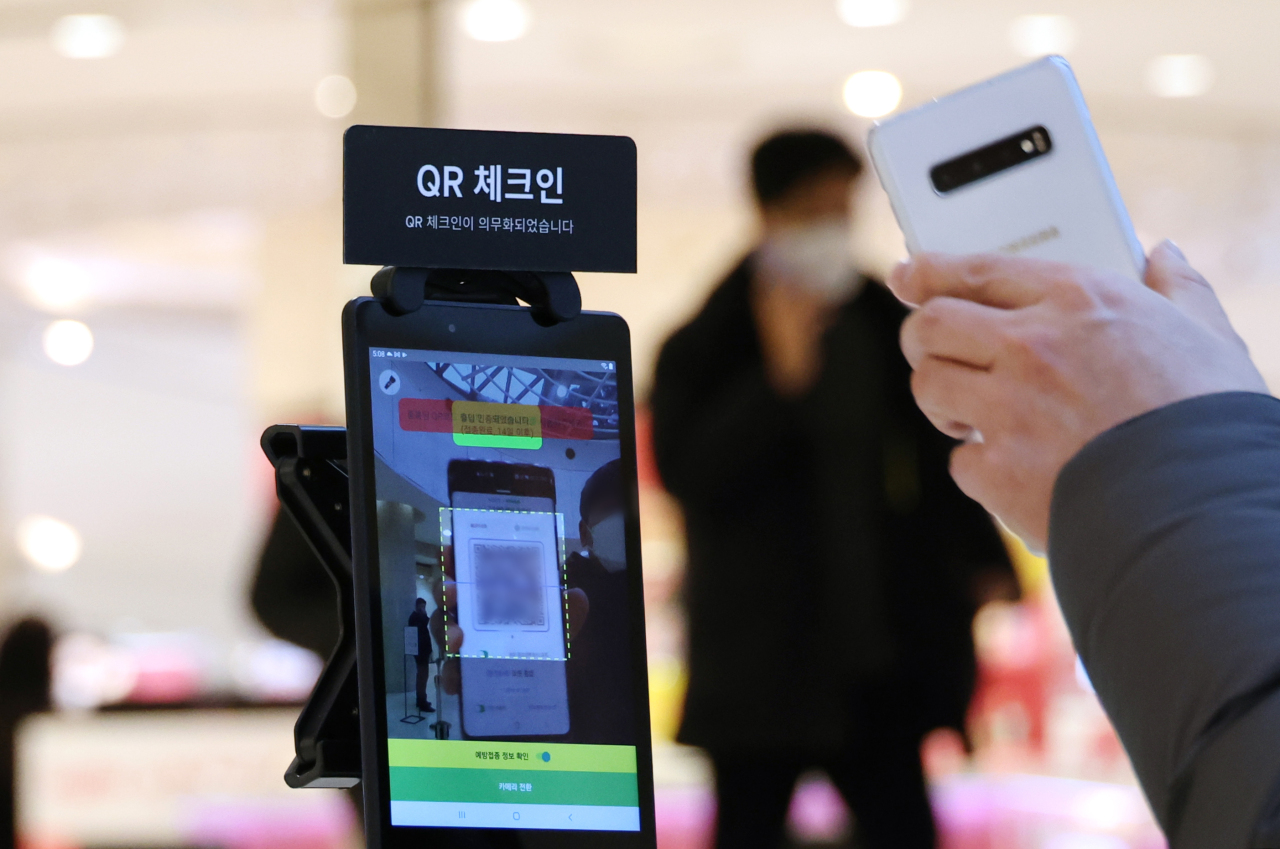 |
Under the vaccine pass mandate, QR codes containing personal information such as vaccination status are scanned before entering public places. (Yonhap) |
South Korea is suspending the use of the COVID-19 vaccine pass nationwide from Tuesday, citing a high vaccination rate and continuing legal challenges.
The move comes more than two months since vaccine passes were introduced extensively in early December. While the mandate is lifted, people are no longer required to present proof of being fully vaccinated or have negative test results to enter public places.
The Ministry of Health and Welfare on Monday said the passes were being scrapped for the time being “in the wake of growing discord over their necessity amid a high vaccine uptake.” The ministry however stressed that the suspension was temporary and that it could be reinstated if circumstances require.
In addition, plans for a vaccine pass for minors 18 and under, which was set to come into force from April 1, have also been put on hold.
The ministry announcement follows a Feb. 23 ruling from a Daegu court that blocked the use of vaccine passes at cafes and restaurants for people under the age of 60. In reaching the decision, the court said vaccine passes were not in line with the government’s omicron response policy, which considers the virus to be nonthreatening for people under 60.
The court said when vaccine passes were first implemented, delta was the dominant virus. But as of Feb. 19 omicron accounted for 98 percent of new infections.
”According to health authorities Feb. 21, in people under 50 the case fatality rate for omicron is close to zero. Among fully vaccinated people of all ages, omicron is about as fatal as, or even less so than the seasonal flu,” the court said in its ruling.
The court also said the mandatory passes were initially only used at high-risk venues like indoor gyms, karaoke bars and other adult entertainment establishments, before they were applied to many everyday venues like restaurants, libraries and grocery stores.
“As contact tracing and other measures end, it’s hard to justify keeping vaccine passes at places essential to sustain living at the cost of sacrificing basic rights,” it said. “Though it should be noted that in nonessential places that are considered high risk, maintaining their use appears necessary.”
In a phone call with The Korea Herald, infectious disease professor Dr. Kim Woo-joo of Korea University questioned forgoing the passes at hospitals, nursing homes and nonessential places like adult entertainment establishments.
“It’s difficult to fathom why the ministry had gone further than the scope deemed necessary by the court in dropping the mandates,” he said.
Kim pointed out just a few days ago, Health Minister Kwon Deok-cheol had said on the Daegu court decision that there were “no plans for stopping the passes in the rest of the country.”
“Cafes and restaurants are generally a risky place to catch the coronavirus,” the minister had said.
Vaccine passes are just one of many public health measures Korea has abandoned over February.
As a principle those infected with COVID-19 are asked to recover from home, except for those exhibiting severe symptoms. Access to PCR testing is restricted to people 60 and over, while the rest take rapid antigen self-tests. Contact tracing and quarantine requirements have ended.
“The old ways of controlling the virus are no longer viable, nor necessary with omicron,” Health Ministry spokesperson Son Young-rae said. He explained the large surge driven by omicron, which is considerably milder than delta, would help Korea get to an endemic phase.
By Kim Arin (
arin@heraldcorp.com)








